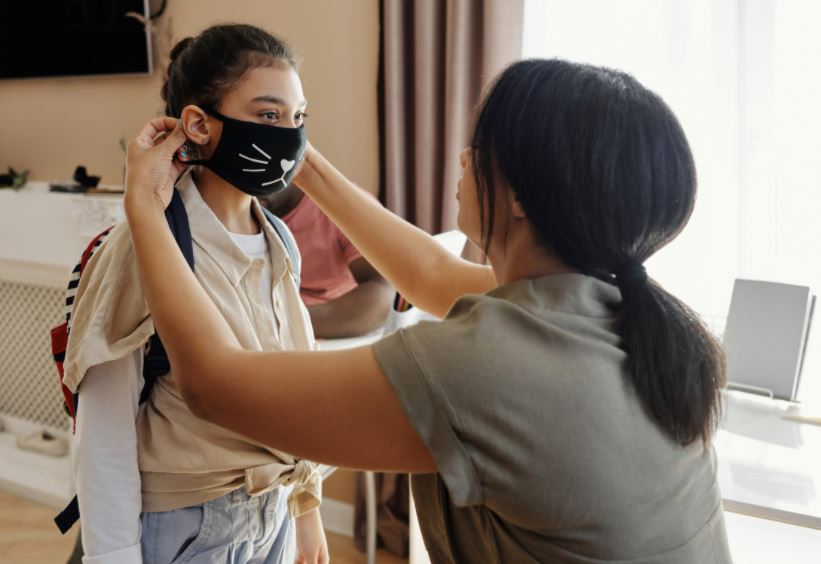But what about our children? Suddenly deprived of their budding social circles, sequestered away at home with parents and siblings who themselves are grounded at home with work and school — the transition has been a confusing and frustrating process for young ones.
“COVID has taken a toll on everyone, but the most deeply affected group are kids, who’ve suffered through disruptions in how they learn and build relationships,” says Naomi Allen, Founder and CEO of Brightline, a California-based company offering easy-to-use virtual mental health solutions for kids. “Isolated from extended family, friends, classmates, extracurricular activities and holiday traditions, they are among those most affected and the most important investment because they represent our future.”
Brightline tells us that the number of children’s emergency room visits this year for mental health increased by 31% for kids aged 12 through 17, while kids ages 5-11 experienced a 31% increase from March to October alone.
For Anastasia Naftalieva, a certified life and success coach, mental wellness remains at the forefront of her mind. “During this pandemic, I have been working from home with two girls (under two) while running my coaching business,” she tells us. “Having uninterrupted time for focused work is a challenge. While balancing the demands of work and home, having time to yourself as a working parent can also be a challenge.” It’s why she founded the Hey Mom Collective, a self-care and empowerment membership-based community for moms in business.
“Despite the challenges, prioritizing your mental wellness has never been more important,” she stresses. “A recent survey by the American Psychological Association found that 63% of parents feel they’ve lost emotional support during the pandemic. With school and daycare closures, a shift to remote work, or employer lay-offs and business closures, everyday life not only looks different, these lifestyle changes also trigger stress and anxiety for many.”
As the future remains largely uncertain, it’s important to make new adjustments and develop patterns that establish consistency going forward, despite the unusual times. Nowhere is that more important than on the homefront where family members are learning to adjust.
Respecting Family Member’s Boundaries
Today, families are sequestered together in smaller spaces than they are used to, and spending more time together than ever before. This is a significant change from our usual busy, on-the-go lifestyles, and it can certainly take some getting used to.
Everyone has their own opinions when it comes to COVID-19, and some choose to reconvene for the holidays, it’s important to respect one another’s boundaries and establish healthy communication habits going forward.
Having Productive Conversations
It is likely that you will disagree on a topic or two when the family is all together, but there are some ways to positively reinforce productive conversation, no matter which side of the fence you fall on. Reducing family tension in conversation can prevent children from being so overwhelmed.
- Give everyone a chance to speak.
Just as you deserve the opportunity to speak, it’s important that you extend others the same courtesy by allowing others to voice their opinion. Even if you disagree, it never hurts to learn another point of view so try to keep an open mind and interrupt as little as possible, so everyone feels respected and welcome.
- Practice using positive language.
Conversations can quickly become heated when members disagree, but don’t take the bait. Instead, take a deep breath and remain calm, using positive language to de-escalate what could easily become an ugly situation.
- Stick to the facts.
When things get emotional, conversations can quickly spiral out of control. Instead, use facts as much as possible and steer clear from personal opinions.
- Don’t be a part of the problem.
It is easy to focus on the negatives, but that accomplishes nothing except increasing agitation. Instead, change your focus to potential solutions, so the conversation takes a more neutral, less combative turn.
- Keep an open mind.
Remember that everyone does not have to agree. COVID-19 has affected people around the world in different ways. Rather than justifying or disputing anyone else’s opinions, respect them as coming from someone you care about.
COVID-19 is an evolving situation with a variety of real and perceived impacts; fear levels and susceptibility range widely among all groups. Regardless of where you land on the scale, choose to focus on the ways you are able to still enjoy one another’s company, because many families this season have been touched by loss.
Visiting Family During The Pandemic
Travel is notably different this year as well. Celebrating the holidays during a pandemic means heavy travel restrictions and even outright travel bans in some places.
Still, many families are planning to hit the road. Prolonged periods of separation combined with the end-of-year holidays motivate many families to travel to be with loved ones.
When making your holiday travel plans, taking extra safety precautions can help protect your family.
Safety Tips For Traveling To See Family Members
- Drive whenever possible.
In the privacy of a personal vehicle, you are less susceptible to germs and disease from those around you. By using your own car or even a family member’s vehicle, you can limit your exposure to COVID-19 while away from home.
The Centers for Disease Control and Prevention (CDC) warns that “Airports, bus stations, train stations and rest stops are all places travelers can be exposed to the virus through respiratory droplets.” The amount of time spent in line for security and check-in can pose significant risk to you and your family. It may take a little longer to drive, but it is certainly safer.
- Shop in advance.
If you stock up on all of your groceries before you travel, you can beat the crowds. Many shoppers are already hitting the stores, and the numbers are likely to increase as the holidays get closer. You can limit your time in line (and therefore, your exposure) by skipping the last-minute shopping and buying in advance. Ordering groceries for delivery or pickup is another great way to avoid crowded stores.
- Get tested.
Before you hit the road, you may want to consider getting tested for COVID-19. Grandparents or those with compromised health are especially high-risk individuals susceptible to viral infections, so if you get tested before your arrival, you can ensure better peace of mind for everyone.
The CDC provides specific guidelines for testing and quarantine after travel: get tested 1-3 days before travel and get again tested 3-5 days after travel is complete. The CDC also recommends staying home for seven days after travel.
- Follow state and local guidelines.
When traveling, it is important not only to be cognizant of federal travel guidelines, but also those that may be in place by specific state and local mandates. Before traveling, be sure to regularly check on national, state and local travel and health guidelines so you are aware of the risk and can adjust your plans as necessary. There are several apps designed to provide real-time COVID-19 tracking, and you can also check the CDC’s trip planner to input your destination for specific infection rates and travel guidelines in that specific area.
TSA is also upfront about infection and recovery rates among its own staff, offering the latest details by airport on its Coronavirus (COVID-19) Information page.
Safety Tips For Hosting Family Members
If you are hosting this year, there are some extra preparations you can make to keep the whole brood safe.
- Create a “sanitation station.”
In the entryway, lobby or foyer, add a sanitation station where guests can stop to wash their hands to prevent any outside germs from coming inside. You can also include hand sanitizers and masks, so guests have a place to get settled, with a gentle reminder to stay safe.
- Request that your family is tested.
Before the family convenes in close quarters, be sure to ask every household to get tested before coming to yours. Traveling family members should exercise the same travel tips we discuss above, with the additional measure of COVID testing before the celebration.
- Stock those cleaning supplies.
Before the family arrives, take the time to stock up on extra cleaning supplies. You will need to have more on hand to sanitize each room after it is used. COVID-19 can live on surfaces for hours or even days, depending on the type of surface, so be sure to use a disinfectant to wipe down surfaces. Have extra cleaning supplies ready so you can sanitize each room after your guests are done using them.
- Check your home insurance.
When buying home insurance policies, we are typically more concerned with our family that lives with us on a daily basis, but it’s important for your policy to have adequate liability in place for any time visitors are present. If someone is injured in your home, the medical payments portion of your homeowners insurance will typically cover any expenses. Ask your insurer whether you can be held liable if someone contracts COVID-19 in your home, as every policy is different, and your insurer may make special accommodations in light of the pandemic.
Extra Safety Tips For Older and High-Risk Relatives
For the high-risk and older members of the family, there are a few other items worth considering.
- Move things outdoors.
Wherever possible and weather permitting, try to move the celebrations outdoors where the family can spread out. It allows you to gather more freely with less risk of exposure.
- Avoid direct physical contact.
We traditionally greet our family members with physical affection, but those hugs and kisses are easy ways to transmit viral infections. To keep your family safe, instead use a verbal greeting that lets your relative know that you are happy to see them, but also are invested in their safety.
- Wear a mask.
It may seem excessive at home to wear a mask at home, but COVID-19 is easily transmitted through respiratory droplets, and can infect people who are in close proximity. Whenever you are in the same room or within six feet of one another, consider using masks.
Socially Distant Activities
With children stuck at home and boredom ranking at an all-time high, it’s the time for creativity to rescue those kids from their daily monotony. Coronavirus has stripped away normal childhood activities like playdates, sports, activities and even in-person schooling.
It is critical that parents create as normal of a routine as possible for their kids who still need to learn socialization and communication skills, regardless of the pandemic. These are some fun, socially-distant activities that kids can safely enjoy this holiday season.
Socially Distant Activities For Kids
Zoom, FaceTime and similar technologies are a great way for your children to enjoy time with their friends without risk. These virtual playdates allow your children to see and communicate with their friends and classmates without the threat of infection.
During your children’s next playdate, consider one of these fun activities.
- Scavenger hunt
Put together a list of common household items that can be easily found. Read each item one at a time, giving the children an opportunity to search their home for the item. The first one back in the video frame with the items wins. Not only will the kids get a little physical activity, but it also allows for a little friendly competition.
- Show and tell
Show and tell is a fun childhood activity that can easily be transitioned to a virtual format. However, you may have to calm excited children and remind them to wait their turn before speaking or sharing.
- Storytime
Reading children a book instead of watching a video is a great way to spend time with your loved ones, while also reinforcing the lessons they are learning in school. Take turns reading, so the little ones in your life have a chance to practice their reading and speaking skills. Setting up a mini “book club” for kids is also a great alternative that Zoom can help orchestrate.
After-School Activities
With children sheltered indoors, they may be missing the outdoor recess and sports that they typically enjoy. While health guidelines still promote social distancing, parents can help their children get outdoors and soak in some Vitamin D.
- Bike rides
Gyms and recreational facilities being closed has caused Americans to get back to basics with fitness. A bike ride is one of the ways you can get outside and enjoy physical exercise, and it’s particularly great as a family activity.
- Freeze dance
Get kids moving with a game of freeze dance if you or another adult is willing to host. Be sure to keep everyone six feet apart, even using hula hoops or cones to provide easy six-foot markers for the kids and create boundaries for the game.
- Walks and hikes
Daily walks and hikes as a family are a great way to get in extra activity and explore trails or hidden parks in your area. Be sure to limit hikes to just your family to reduce exposure to others.
Resources
If you or your family have been hit especially hard during 2020, you may find these resources beneficial.
Food-Related Resources
The Supplemental Nutrition Assistance Program (SNAP) provides federal assistance from the U.S. Department of Agriculture’s Food and Nutrition Service so that no family goes hungry. To apply, contact your local SNAP office for assistance.
The Special Supplemental Nutrition Program for Women, Infants, and Children (WIC) uses federal grants to provide state-level support for women and children who need nutritional support.
Calming and Meditation
Apps like Calm and Headspace have skyrocketed in popularity since COVID-19, as people of all ages look for a calming or meditative outlet for their pandemic stress.
Handwashing guidelines
Handwashing instructions can be a little more difficult for children to remember, especially when their impatience gets the better of them. Reinforce healthy handwashing guidelines with the use of simple, easy-to-understand instructions you can post around the house.
Reducing Sibling Conflict
It’s only natural for tempers to flare when confined to close quarters, so it may help to research some new ways to keep the peace while everyone is sequestered indoors.
Preparing For The Holidays
This year, the holidays may look a little different than your children may be used to. There are resources that can help the entire family adjust more easily, such as HealthyChildren.org from the American Academy of Pediatrics.
No matter how you celebrate, there are many ways for you and your whole family to safely enjoy the holidays this year.












